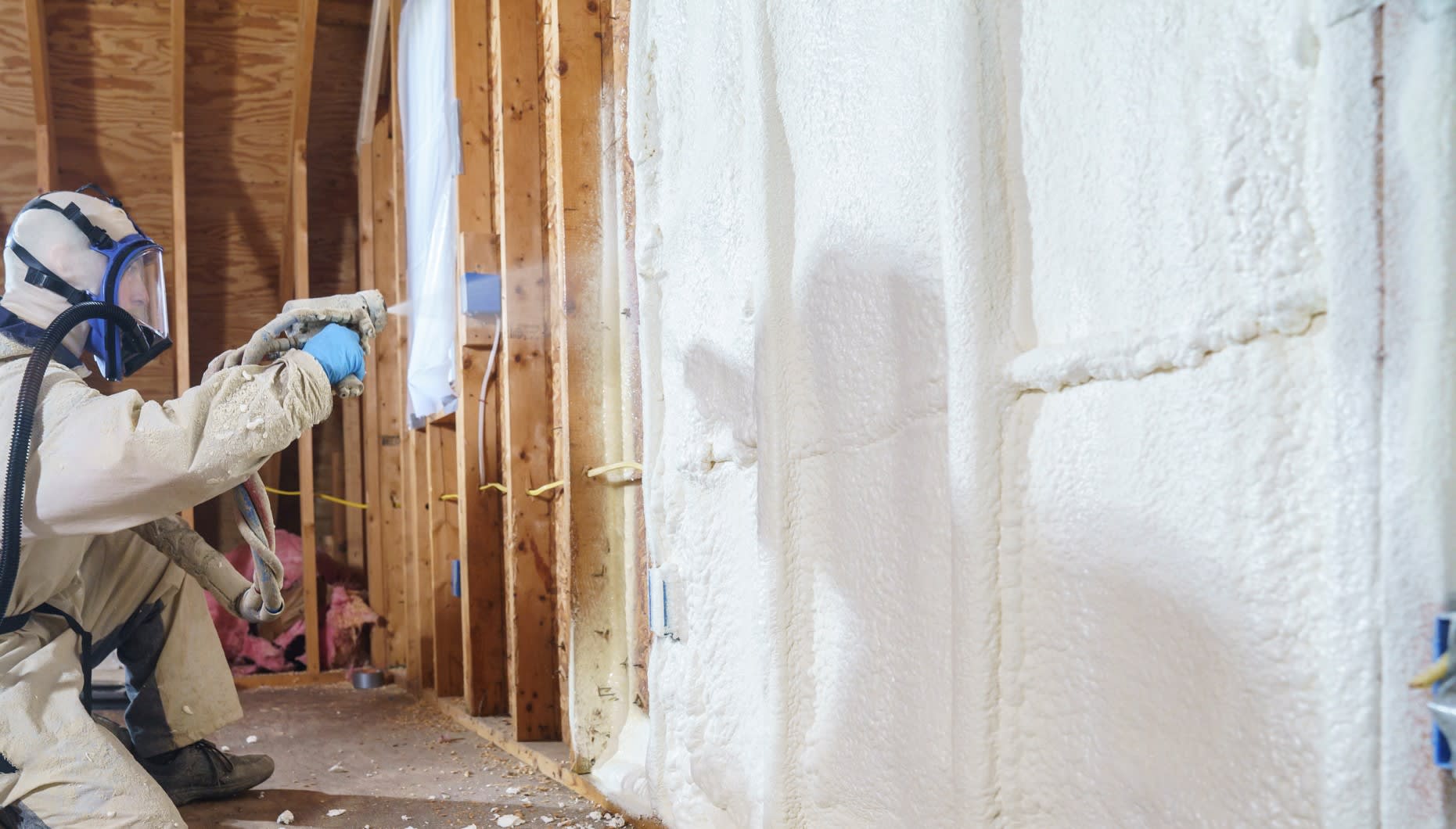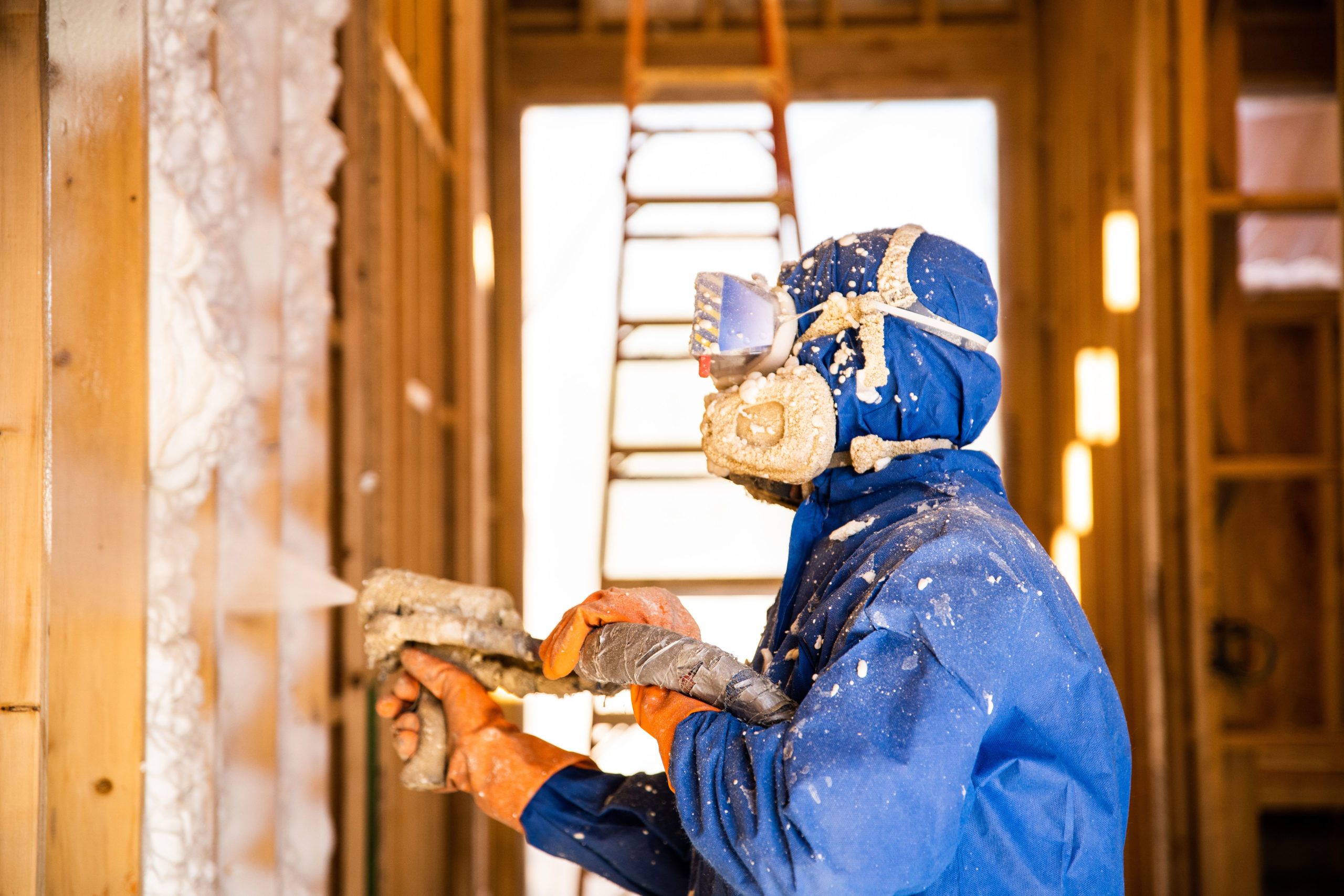How Spray Foam Can Enhance Energy Efficiency in your house
How Spray Foam Can Enhance Energy Efficiency in your house
Blog Article
Spray Foam: The Ultimate Service for Air Sealing and Insulation
Spray foam insulation has arised as a leading remedy for effective air sealing and thermal insulation, providing a special combination of buildings that set it apart from standard methods. Its capacity to expand and fill voids makes it specifically reliable in preventing air leak, which can substantially impact power performance. Nonetheless, recognizing the complete extent of its advantages, installment processes, and comparisons with various other insulation kinds is essential for making educated choices. As we discover these elements, the effects for both new constructions and retrofits come to be significantly considerable. What variables should affect your selection?
What Is Spray Foam?
Spray foam is a versatile insulation material that combines the principles of air sealing and thermal resistance to boost power effectiveness in buildings. Made up largely of polyurethane or other comparable substances, spray foam is used as a liquid that expands upon call with surfaces, creating a strong, continuous layer of insulation. This unique home permits it to load gaps, fractures, and gaps that standard insulation products may overlook, offering a remarkable air seal.
There are 2 main kinds of spray foam: open-cell and closed-cell. Open-cell spray foam is lighter and a lot more versatile, using exceptional audio absorption and a reduced R-value per inch - Spray Foam. On the other hand, closed-cell spray foam is denser, supplying a greater R-value, wetness resistance, and included architectural stability to constructing components
The application process generally involves specialized tools, guaranteeing a smooth application that complies with various substrates, consisting of metal, wood, and concrete. This flexibility makes spray foam ideal for both brand-new building and constructions and retrofitting existing structures. Its ability to develop a closed obstacle considerably adds to decreasing energy usage and enhancing interior air top quality, consequently making it a recommended selection among home owners and contractors alike.
Advantages of Spray Foam Insulation
Among one of the most significant advantages of spray foam insulation is its remarkable ability to develop a constant air barrier, which successfully reduces energy loss. Unlike traditional insulation products, spray foam expands to fill up splits and gaps, ensuring that air leak is drastically reduced. This characteristic not just improves energy effectiveness yet also causes reduce utility costs gradually.
Additionally, spray foam insulation provides premium thermal resistance, adding to a much more stable indoor setting. Its high R-value per inch permits efficient insulation in constrained rooms, making it excellent for attics, wall surfaces, and crawl areas. Moreover, the moisture-resistant properties of spray foam assistance stop mold and mold growth, advertising healthier living problems.
An additional vital advantage of spray foam insulation is its sound-dampening qualities (Spray Foam). It effectively decreases noise transmission in between areas, producing a quieter and more comfy home atmosphere. The durability of spray foam additionally stands apart, as it does not sag or settle over time, preserving its performance throughout its lifespan
Exactly How Spray Foam Functions
Comprehending just how spray foam insulation works is necessary for appreciating its effectiveness in air securing and thermal resistance. Spray foam insulation consists of two main components: isocyanate and polyol material. When these elements are combined, they undertake a chain reaction that causes the product to increase rapidly, producing a dense foam that fills up fractures, dental caries, look at here and voids.
As the foam expands, it sticks to surface areas, creating an impermeable seal that dramatically reduces air seepage. This characteristic makes spray foam insulation highly efficient at avoiding drafts and dampness penetration, which can cause energy loss and damage over time. Furthermore, the closed-cell variant of spray foam offers premium thermal resistance as a result of its stiff structure, efficiently reducing warm transfer.
The distinct homes of spray foam enable it to comply with uneven surface areas, ensuring thorough insurance coverage and a seamless obstacle. As a result, spray foam insulation not only boosts power performance but additionally adds to boosted indoor air quality by lowering the buildup of allergens and contaminants. Inevitably, recognizing the mechanics behind spray foam underscores its role as a premium selection for insulation and air securing in both commercial and property applications.
Installment Process Summary

Before installment, the area should be properly cleaned up and prepped, making sure that surface areas are cost-free from debris, dirt, and dampness. This action is important since contaminants can compromise bond and overall efficiency. As soon as the area is prepared, the application includes mixing both components of the spray foam, which expands upon contact and loads gaps effectively.
Educated specialists need to carry out the installment, using customized tools to guarantee consistent protection find out this here and optimal thickness. Security precautions, consisting of wearing safety gear and making sure correct air flow, are critical throughout this procedure. After application, the foam usually remedies promptly, forming a strong barrier that enhances energy effectiveness.
Comparing Spray Foam to Standard Insulation
When reviewing insulation options, spray foam insulation stands out in comparison to typical products such as fiberglass and cellulose. Unlike fiberglass and cellulose, which can enable air infiltration, spray foam expands upon application, loading voids and gaps to develop a closed seal.
Additionally, spray foam offers a higher R-value per inch than standard insulation types, providing even more efficient thermal resistance in a thinner account. This particular is particularly useful precede with limited cavity depth. Spray foam is resistant to dampness and mold growth, which can be a substantial concern with cellulose and fiberglass, particularly in humid atmospheres.
Nevertheless, spray foam insulation commonly lugs a greater ahead of time cost than its standard equivalents. Property check this owners need to consider this initial investment versus lasting power savings and performance benefits. Eventually, while both insulation kinds serve their purpose, spray foam becomes a much more innovative remedy for modern insulation needs, particularly in terms of air securing and thermal performance.

Conclusion
In recap, spray foam insulation stands for a very reliable solution for achieving optimal air sealing and thermal resistance. Its unique residential or commercial properties, including moisture resistance and audio dampening, make it ideal for different applications in both new buildings and retrofitting jobs (Spray Foam). Although the preliminary expenses may be greater contrasted to conventional insulation materials, the long-term advantages, such as considerable energy savings and improved interior air high quality, justify the financial investment and emphasize its value in modern structure methods.
Spray foam insulation has arised as a leading service for effective air securing and thermal insulation, offering an one-of-a-kind combination of residential or commercial properties that set it apart from standard techniques.Spray foam is a versatile insulation product that combines the concepts of air sealing and thermal resistance to boost energy effectiveness in buildings.When assessing insulation alternatives, spray foam insulation stands out in comparison to traditional products such as fiberglass and cellulose. Inevitably, while both insulation types offer their purpose, spray foam arises as a more sophisticated solution for contemporary insulation needs, especially in terms of air securing and thermal efficiency.
In summary, spray foam insulation stands for a highly efficient remedy for achieving ideal air securing and thermal resistance.
Report this page